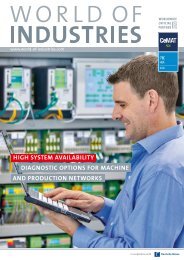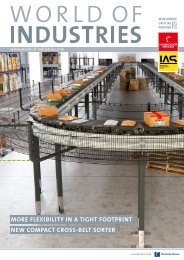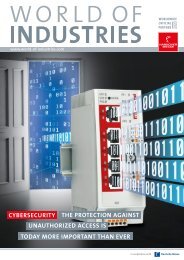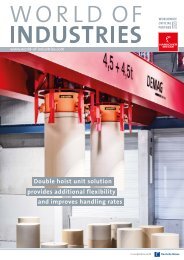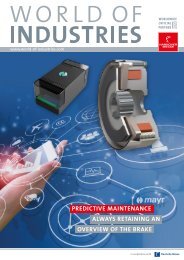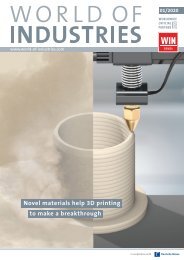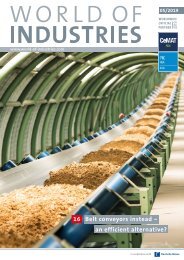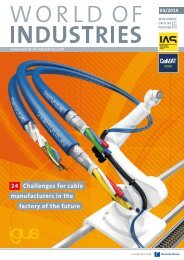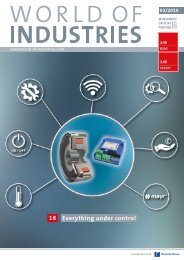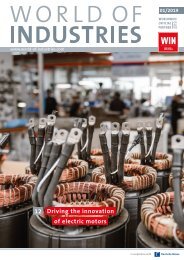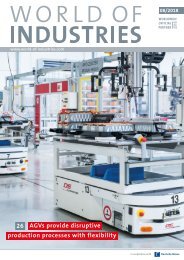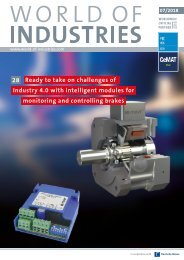WORLD OF INDUSTRIES - MOTION, DRIVE & AUTOMATION 2/2017
WORLD OF INDUSTRIES - MOTION, DRIVE & AUTOMATION 2/2017
WORLD OF INDUSTRIES - MOTION, DRIVE & AUTOMATION 2/2017
- TAGS
- mda
- automation
- industries
You also want an ePaper? Increase the reach of your titles
YUMPU automatically turns print PDFs into web optimized ePapers that Google loves.
politicians and Trump’s administration in the US, who are blaming<br />
Germany’s export policy and the Euro for the economic imbalance.<br />
Critics believe that Germany’s trade balance can be systematically<br />
manipulated with the exchange rate. But with today’s integrated<br />
global value chains, even industrial exports now consist many<br />
imported inputs, which means, the effect of exchange-rate fluctuations<br />
on prices and the trade balance is no more a dominant factor.<br />
Germany owes its export success to its strong market position, competitiveness<br />
through innovation and the pricing power of its highly<br />
specialized manufacturing champions. Even Prior to adopting the<br />
common currency, these were the central features of Germany’s<br />
Wirtschaftswunder (“economic miracle”).<br />
Germany’s trade surplus reflects the competitiveness of its exports<br />
but at the same time it also shows the lack of imports and government<br />
spending and investments. It has one of the lowest publicinvestment<br />
rates in the industrialized world. Germany should<br />
improve its digital and transportation infrastructure; strengthen<br />
market mechanisms to encourage more renewable-energy development;<br />
address its shortage of skilled labor; change its taxation policy<br />
provide incentives to invest; and reform its regulations to reduce<br />
uncertainty. With a general election coming up in September, Chancellor<br />
Merkel might be under pressure to debate more on the issue<br />
of trade surplus or increase public spending, as voices in Germany<br />
rise for fiscal loosening. But in a country where voters view fiscal<br />
prudence favorably, it is unlikely to see a major turnaround.<br />
Industry 4.0: opening new avenues<br />
In the words of German Chancellor Mrs. Merkel “Industry 4.0 is the<br />
comprehensive transformation of the whole sphere of industrial<br />
production through merging of digital technology and the internet<br />
with conventional industry.” In short, everything in and around a<br />
manufacturing operation including the production process, the<br />
factory, the suppliers and distributors, even the product itself is<br />
digitally connected, providing a highly integrated value chain.<br />
Industry 4.0 depends on a number of new and innovative technological<br />
developments:<br />
n The application of information and communication technology<br />
(ICT) to digitize information and integrate systems at all stages<br />
of production<br />
n Cyber-physical systems that use ICTs to control physical processes<br />
and systems involving embedded sensors and intelligent robots<br />
n Network communications including wireless and internet technologies<br />
that serve to link machines, devices, work products,<br />
systems and people, both within the manufacturing and with<br />
suppliers and distributors<br />
n Simulation, modeling and virtualization during product design<br />
and the establishment of manufacturing processes;<br />
n Collection of vast quantities of data, and their analysis, immediately<br />
on the factory floor or through big data analysis and cloud<br />
computing; and intelligent tools of predictive maintenance<br />
In all these sectors, be it ICT, Cyber-physical systems, Network<br />
communications or Simulations, German companies already<br />
have immense technical expertise, which makes Germany and its<br />
companies not just relevant but in fact market leaders right from<br />
the start. Industry 4.0 is expected to have a major effect on global<br />
economies. A report from the European Commission says industry<br />
4.0 can deliver estimated annual efficiency gains in manufacturing<br />
of between 6 % and 8 %. The Boston Consulting Group predicts that<br />
in Germany alone, Industry 4.0 will contribute 1 % per year to GDP<br />
over the next ten years, creating up to 400,000 jobs. Historically,<br />
technological revolutions have created new jobs and the requirement<br />
for different kinds of roles. The nature of manufacturing work<br />
has been shifting from largely manual labor to programming and<br />
control of high performance machines. As in the past, some jobs will<br />
evolve, some will be eliminated, and others will be created. Workers<br />
who are able to make the transition to Industry 4.0 may find greater<br />
autonomy and more interesting or less arduous work. Employers<br />
need personnel with creativity and decision-making skills as well as<br />
technical and ICT expertise. By 2020, labor markets in the EU could<br />
be short of more than 800,000 professionals; this shortage may be<br />
even more pronounced in advanced manufacturing settings where<br />
big data analysts and cyber security experts are required.<br />
Photograph: Lead Fotolia z<br />
‘An application of Industry 4.0 based<br />
technologies in manufacturing set up’<br />
The Siemens electronics plant in Amberg (Germany) produces<br />
customized PLCs in a state-of-the-art ‘smart factory’<br />
where product management, manufacturing and automation<br />
systems are integrated. Intelligent machines coordinate the<br />
production and distribution of 950 products with more than<br />
50,000 different variants, for which roughly 10,000 materials<br />
are sourced from 250 suppliers. By linking intelligent machines<br />
with data-rich components and workers, innovation cycles can<br />
be shortened, productivity raised and quality improved: the<br />
Amberg plant now records only 12 defects per million (versus<br />
500 in 1989) and has a 99 % reliability rate.<br />
CUSTOM TAILORED<br />
<strong>DRIVE</strong> SOLUTIONS FOR<br />
Machine Tool<br />
Aerospace<br />
Automotive<br />
Renewable energy<br />
Brandenburger Strasse 10 D-88299 Leutkirch im Allgäu<br />
phone +49 7561 98248-0 info@ate-system.de<br />
www.ate-system.de<br />
<strong>WORLD</strong> <strong>OF</strong> <strong>INDUSTRIES</strong> – <strong>MOTION</strong>, <strong>DRIVE</strong> & <strong>AUTOMATION</strong> 2/<strong>2017</strong><br />
ATE.indd 1 21.03.<strong>2017</strong> 15:17:26



